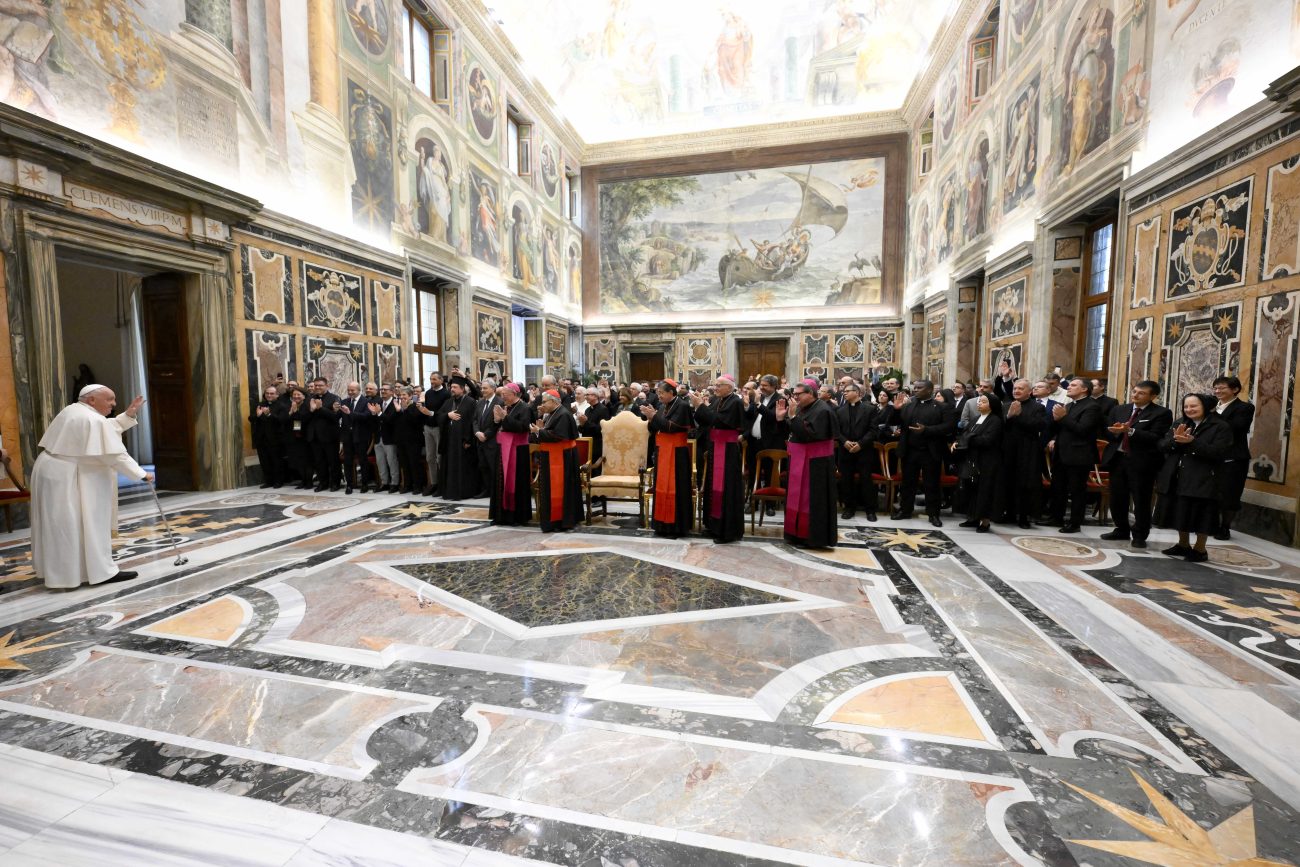VATICAN CITY (CNS) – Christian martyrs from across denominations hold a place of honor in the church, Pope Francis said, highlighting their examples of faith and courage that continue to inspire Christians today.
“Even today, in many parts of the world, there are many martyrs who give their lives for Christ,” he told participants in a conference on martyrs organized by the Dicastery for the Causes of Saints.
“In many cases,” the pope said, “Christians are persecuted because, pushed by their faith in God, they defend justice, truth, peace, human dignity.”
The conference, titled “No Greater Love: Martyrdom and Offering of Life,” took place in Rome Nov. 11-14 and featured talks by scholars, theologians and religious leaders exploring the theological, historical and cultural dimensions of martyrdom.
Meeting with conference participants Nov. 14, Pope Francis pointed to the enduring courage and sacrifice of modern-day martyrs, such as the 21 Coptic Christians who were kidnapped and beheaded in Libya in 2015.
Although they were not Catholics, “they were Christians, they are martyrs and the church venerates them as its own martyrs,” the pope said.
“With martyrdom there is equality. The same happens in Uganda with the Anglican martyrs,” he said, referring to the Uganda Martyrs, a group of 23 Anglican and 22 Catholic converts executed in the late 19th century for their faith. “They are martyrs, and the church receives them as martyrs.”
The pope quoted his formal proclamation of the Holy Year 2025, “Spes Non Confundit” (“Hope Does Not Disappoint”), stating that martyrdom is “the most convincing testimony” to hope.
That’s why, Pope Francis said, he instituted a commission in the Dicastery for the Causes of Saints to study and document the lives and testimonies of contemporary martyrs from various Christian denominations, so that their witness can inspire faith and unity among Christians during the Holy Year 2025.
To be a saint, more is needed than merely “human effort or a personal commitment to sacrifice and renunciation,” the pope said. “First of all, we must allow ourselves to be transformed by the power of God’s love, which is greater than us and makes us capable of loving even beyond what we thought we were capable of.”
Martyrs do not require a confirmed miracle to be beatified, he noted, because “the martyrdom is sufficient.” Joking, he told members of the saints’ dicastery, “that way we save a bit of time, of paper and money.”
Pope Francis outlined three fundamental elements of martyrdom that he said are still valid today: First, a martyr must accept a violent and premature death rather than renounce their faith. Even an unbaptized Christian can do this, he said. “Who is a Christian at heart confesses Jesus Christ by the baptism of blood.”
Second, he said, the martyr is killed by a persecutor motivated by hatred of the faith or another virtue associated with it, such as the defense of “justice, the truth, peace (or) human dignity.”
Third, “the victim assumes an unexpected attitude of charity, patience, meekness, in imitation of the crucified Jesus,” the pope said.
“What changes in different eras is not the concept of martyrdom, but the concrete ways in which, in a given historical context, it takes place,” he added.
While different than martyrdom, the pope recalled the pathway to sainthood he introduced in a 2017 which recognized “the offering of life” as a criterion for beatification. Pope Francis said during the meeting that in the absence of the figure of a persecutor, one can be considered to have offered their life for the faith given “the existence of an external, objectively measurable condition in which the disciple of Christ has freely placed his or herself and which leads to death.”
“Even in the extraordinary witness of this type of holiness, the beauty of the Christian life, which knows how to make itself a gift without measure, like Jesus on the cross, shines forth,” he said.
PREVIOUS: Devotion to Mary Leads People to Jesus, to Helping Others, Pope Says
NEXT: Chinese Cardinal Calls for ‘Sinicization’ of Church in China




Share this story